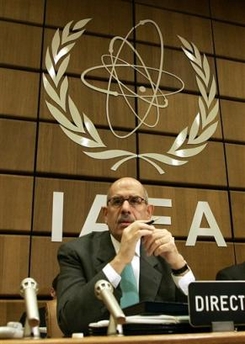|
US hopes to build coalition on Iran sanctions
(AP)
Updated: 2006-03-07 15:37
The United States would want European and other countries to join in imposing
travel and financial sanctions on Iran if Tehran refuses to halt nuclear
enrichment, a senior US official said on Monday.

Director General
Mohamed ElBaradei waits for the start of the International Atomic Energy
Agency's (IAEA) 35-nation board meeting on the escalating nuclear standoff
with Iran, on Monday, March 6, 2006, at Vienna's International Center.
[AP] | Undersecretary of State Nicholas Burns, in
a television interview late Monday night, said the world must be "toughminded"
as diplomacy toward Iran moves into a new phase in the U.N. Security Council.
"So in order to get the attention of the Iranians and convince them that
they've got to roll back, you might have to arrange a coalition of countries --
and I don't know if Russia and China will be part of that --...that would apply
targeted sanctions" on the ability of Iranian leaders to travel and use the
international financial system, Burns said on Public Television's "The Charlie
Rose Show."
He spoke as the International Atomic Energy Agency governing board met in
Vienna to decide the next steps on Iran, which the West accuses of developing
nuclear weapons. Tehran insists it only aims to produce nuclear energy.
The IAEA's 35-member board reported Iran to the Security Council a month ago.
It urged Iran to heed resolutions to halt uranium enrichment work and stop
stonewalling IAEA inquiries.
Tuesday, the IAEA board will consider IAEA chief Mohammed ElBaradei's latest
report before it is sent to the council, which might eventually consider
sanctions if diplomacy fails.
Burns acknowledged that not all states are amenable to imposing sanctions and
suggested Washington might seek to have willing countries act outside the
Security Council.
Russia and China, veto-wielding council members, have long made clear their
reluctance to have the world body punish Iran.
ElBaradei said Monday a deal to defuse a standoff over Iran's nuclear aims
was still possible, with diplomats outlining a compromise that would let Tehran
pursue some atomic research.
But the United States dismissed the possibility that Iran might be allowed to
continue small-scale nuclear enrichment and Burns predicted the Security Council
will take up Iran's case, barring a "dramatic about-face" by Tehran.
"So unless there is dramatic about-face, I suspect the IAEA board is going to
confirm the judgment of 30 days ago, in early February, and then this issue will
now be taken up quite actively by the U.N. Security Council and that's where it
should be," Burns told the conservative Heritage Foundation.
State Department spokesman Tom Casey said he was unaware of any specific
small-scale enrichment proposal for Iran.
He told reporters: "You can't be just a little pregnant. You can't have the
regime pursuing enrichment on any scale, because pursuing enrichment on any
scale allows them to master the technology, complete the fuel cycle -- and then
that technology can easily be applied to a clandestine program for making
nuclear weapons."
|